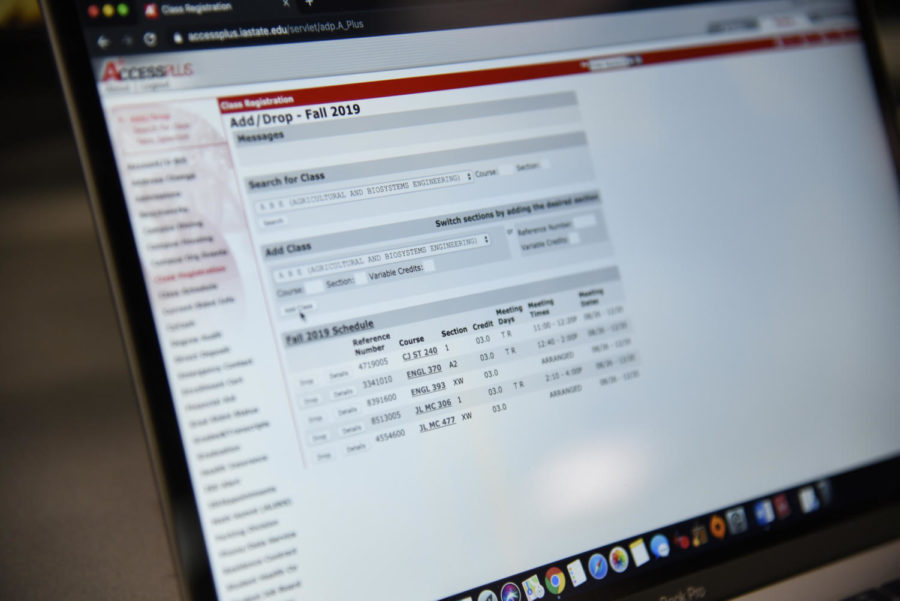Weingarten: A note on the American student loan dilemma
Caitlin Yamada/ Iowa State Daily
The class registration place is located on AccessPlus. The RAN number can be obtained from an academic adviser and is required for a student to register for classes through AccessPlus. Once the RAN number is put in the student can add and drop classes to their schedules.
August 30, 2022
Despite this intense political epoch, President Joe Biden delivered an announcement to an already grim America.
The administration announced its plan to follow through on a campaign promise by alleviating pressure on the student loan crisis. According to the Wharton Business School and their budget model, the plan could cost anywhere from $469 billion to $519 billion over the ten-year budget window (although this could total up to much more, further study is required). Roughly 75 percent of the benefits will go to households making $88,000 or less every year.
The student loan dilemma in America is just as pervasive as any other political issue. The thought of the U.S. government passing a spending bill to alleviate student debt is a painful idea to reconcile for some; for others, it is necessary.
I fall into the boat of thinking it is necessary. The “take a loan, pay it back” mentality is a noble and fair assumption if all other entities who collect debt must live up to the same mantra. I would like to believe that most people disagree with highly expensive wars, big business and bank bailouts, but rarely do we disagree on whether the funds could be placed in a more advantageous situation. Moving forward, the demand for college-educated jobs will increase and take up the bulk of the market.
According to a study by the Georgetown Public Policy Institute, 35 percent of jobs will require at least a bachelor’s degree, 30 percent will require some college or associate degree and 36 percent will not require above high-school education. This tells us we are a society where a college education is going to be more highly valued than in generations past. The study also declares that healthcare, community services and STEM fields hold the most job opportunities moving forward and are also fields where a degree is desired or, in many cases, required.
What does this have to do with loan forgiveness? We shouldn’t punish our future by pummeling it into loan debt with interest that can make the loans hardly payable. Rarely do we discuss the incredible difficulty that borrowers go through to repay their loans, even when they earn high-paying careers. Going back to the “take a loan, pay it back” slogan, what does this mean in the face of crippling interest and an increased total cost of living? Because of bad economic management, we live in a highly volatile market, and making ends meet is all many people can afford.
I believe the government has an obligation to help its citizens, but I also am not so naive as to believe it stops there. The overall cost of education needs to come down, and universities need to quit gutting young students into massive amounts of debt in the first place. The future needs students who can earn a good education without ruining their financial stability before they can drink.
I leave this to you.








Concerned taxpayer | Sep 2, 2022 at 9:17 pm
You compare apples to oranges with the ‘big bank loan’ or other such business loans. A) these banks remaining solvent meant the economy stayed afloat. B) the so called big banks paid the loans back to the US government well before they came due. The other argument I commonly hear is the loans for small business during the pandemic to keep issuing paychecks to workers. Of course there are the one off stories of abuse but the vast majority used the money to pay their employees. So that money didn’t benefit just the business owners but a large percentage of the country at a time when the other option was laying off a huge percentage of workers.
The comparison of this to college loan relief, which only helps the individual who took the loan out, is a silly comparison. It’s more akin to asking for credit card relief. Both are personal decisions made causing one to go into debt and both can be difficult to get clear of. I sympathize with those saddled with high amounts of student loan debt, but it was ultimately a personal decision which they took on themselves. Asking for or demanding a big government bailout at the expense of the taxpayer is selfish and shortsighted. This will only cause more divisiveness and polarization as well as growing the debt we as a nation already have too much of.
Long story short, don’t take loans you are not sure you can pay back. Every loan no matter what it is, is a burden for the person paying it back. It’s part of life. Biden just bought millions of votes at the expense of the taxpayer and I for one am not a fan.